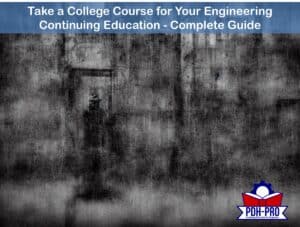Receive Continuing Education Credit for College Courses
In the field of engineering, it is important to stay up-to-date on industry standards and latest developments. In fact, most states consider continuing education to be so important for professional engineers that a certain amount is required to maintain one’s license. In states with professional development requirements, professional engineers must generally complete 15 hours of continuing education programs (CEP) or professional development hours (PDH) for the renewal of their professional license as working engineers.
As an important aspect of the professional development of engineers, continuing education programs help them keep abreast of new developments in their field. For professional engineers, CEPs are also opportunities to learn new skills in their domain and bridge knowledge gaps caused by the advent of new technologies and innovations. Though the CEP or PDH requirements are not education-intensive, professional engineers can use the opportunity to upgrade their qualifications and expertise through continuing education.
Continuing education is also necessary to equip working engineers with leadership qualities as they become seniors in their respective organizations, allowing them to continue on a path of improvement and, ultimately, to give their best at the workplace.
What Activities Qualify for CEP Or PDH?
In choosing activities for CEP or PDH, engineers have some flexibility, as they can self-select courses that interest them. The licensing boards neither prescribe nor approve any course for this purpose, but rather, allow professional engineers to claim their chosen self-study activities as CEP.
However, the boards do prescribe some basic criteria for an activity to be treated as CEP. The first is whether the activity figures in the list of approved activities. Second, if the activity is relevant to the practice of a technical profession. Or third, if it has relevant ethical or managerial components. The idea is that if the activity has something to do with engineering, technical, or managerial education, it can count for CEP and PDH.
Read our article on activities that do not count for continuing education credit.
How Can PDH Units be Earned?
To earn PDH units, you can choose from many activities and academic programs, such as:
- Successful auditing or completion of college credit programs
- Successful completion of continuing education programs offered by entities in the list
- Successful completion of a study program through distance learning, online, videotaped or televised short courses or tutorials
- Patents Issued, self-directed study
- Educational outreach with higher education students
- Teaching, writing, and participation in technical societies
The good news is that the range of course options available will allow you to choose a continuing education program that suits your interests, learning style, and area of expertise.
PDH and Professional Development
Professional engineers seeking renewal of their license need to give proof of continuing education in the form of PDH. While the majority of PEs often take simpler routes to earn the PDH, some PEs who are more serious about their career and growth use the opportunity to enroll in meaningful academic programs. These continuing education programs help them earn an additional degree, and at the same time, the college credits are transferred for their PDH requirements. This flexibility allows the earning of PDH to stay relevant for the busy professional. It also offers professional engineers the opportunity to think about their professional advancement through necessary academic input. Overall, PDH helps PEs stay up-to-date with the latest developments in their field, increases their chances of career growth, and makes them industry-ready.
The PDH and CEP requirements for professional engineers also allow college credits to be treated as PDH units. This has led to a huge number of PEs who choose relevant and meaningful academic programs through alternative formats, such as night, online and weekend classes. This allows PEs to achieve both the PDH fulfillment as well as a new professional qualification. But for this, professional engineers must choose an academic program that is relevant to their field, i.e., engineering. Before enrolling in a program, it is recommended that PEs check with their boards to verify which college courses qualify for PDH considerations.
Converting College Course Credits to Professional Development Hours
The PDH requirement includes 15 hours of continuing education in the professional engineer’s related technical field. However, these 15 hours of PDH units do not all need to be academic. Seminars and workshops attended by professional engineers are also treated as continuing education. Even presentations made for these events or technical articles written for industry journals are treated as continuing education for PDH.
However, many professional engineers prefer to go for a full-fledged new degree, diploma, or certificate program. Credits earned in these college-based academic programs are treated as PDH units. Professional engineers can choose from a host of online programs, night and weekend classes, or special study programs sponsored by their employer. All of these college programs are valid to meet the PDH or CEP requirements, and professional engineers have the benefit of simultaneously getting necessary PDH units for the renewal of their licenses and earning an additional degree or certificate to boost their credentials.
Course Topic Limitations
When considering academic programs for professional engineers, it is important to note that the field of study they choose must be related to engineering for the credit to be considered for PDH requirements.
Guide to Taking College Courses as a Working Professional
Working professionals need more flexibility in terms of class timings and academic schedules for continuing education. They need to work around their professional responsibilities to fit in their academic schedule. They can’t attend regular college classes at their scheduled timing due to many responsibilities related to their families, social life, and professional life.
To meet the academic requirements of these people, many colleges offer night and weekend classes.
Staying Motivated
While night and weekend academic schedules offer a great opportunity for continuing education, a working professional engineer may have difficulty focusing on study after a long day at work. Sometimes, attending night or weekend classes regularly and doing the assignments and projects as per the schedule can become too much of extra responsibility for a professional engineer.
If the academic program is related to technical education, missing even a couple of classes can become a serious obstacle in making satisfactory progress in academics. Maintaining one’s motivation is necessary for continuing education, especially for those who are saddled with the responsibilities of a full-time job. Developing a routine that includes the classes and self-study schedules and sticking to it is of critical significance for a working engineer to continue their education.
Night and Weekend Classes
Most full-fledged colleges and universities offer full-time courses for which classes are held during the day. However, some colleges and universities offer evening and weekend classes in certain fields and disciplines. When looking for a college course and an institution where you can study, check out the websites of your local college and university. You may find that they offer a part-time study program in your chosen field.
Community colleges and technical institutions are often prepared to cater to working people who cannot find time for a daytime college course. These institutions have a diverse range of academic programs and flexible schedules.
However, you should keep in mind that at even these colleges, there are a limited number of weekend and night classes. Registering early for your desired program will ensure that you don’t have to face disappointments at the last minute when you turn up for your enrollment to find that all the seats have been taken.
Decide Your Schedule
If you are a working engineer, you will likely have to choose between night and weekend classes. If you have found a college that offers both schedules, consider which one you are more comfortable with. Weekend programs offer you the convenience of a full day that you can devote to studies, while night classes ensure that your weekends remain free and you can take the classes in the evening after returning from work. Some colleges may offer the flexibility to pick a mixed schedule, meaning that one can take both night and weekend classes.
Night and Weekend Study Programs
As mentioned earlier, there are many community and technical colleges that offer night and weekend classes where working professionals can get enrolled and continue their education. Many of the reputed public universities and colleges have programs in alternative format i.e. night, online and weekend classes. One example is the University of Missouri, St. Louis.
The University of Missouri, St. Louis has an exclusive wing called UMSL Now that offers a wide range of undergraduate, graduate and certificate programs. A benefit to these programs is that they can be pursued through a variety of night, online and weekend classes. University of Missouri–St. Louis is an accredited public university known and trusted for quality education.
USML Now offers the highest number of professional, doctoral, bachelor’s and master’s programs through night, online and weekend classes in its region.
Most evening classes begin at 4 p.m. or 5:30 p.m. so that students can attend other classes as well. After the UMSL scholarship, the tuition fee is $363.20 per credit hour for undergraduate programs. For full details about the fee the program, students can get in touch with USML Now officials or its website.
If you think you are interested in enrolling in a college course to earn your PDH, there may be a program near you. Research the options at your local colleges and universities for more details.
Our Thoughts on College Courses for CEP Credit
Pursuing continuing education while working a full-time job is not easy. However, a lot of people find this to be the route of greater success. If you have chosen to continue your education despite being in a full-time job, you will need to maintain your motivation and stick to an organized schedule for academics, as well as your professional and personal life.
Free College Courses
One downside to earning college credit for PDH is that it may come with a hefty price tag. Fortunately, the internet has made it easier than ever to follow free college courses, and keep on building your knowledge at no additional cost. Below, we’ll review 4 different platforms that offer online college classes in engineering and how you can use them to your advantage.
1. EdX
If you’re looking for college-level courses online, it’s almost impossible not to stumble on EdX. With over 14 million users worldwide, EdX is a course provider with hundreds of listings from prestigious universities. Founded by Harvard and MIT, it offers online college classes from dozens of prestigious institutions like Caltech and UBC.
All the courses on this website are free, but you may need to pay a fee to get an official certificate after completing them. But if expanding on your knowledge is your only priority, then it’s one of the best platforms available today.
For engineers, their selection of courses is wide. Courses range from materials to programming and mechanics, and span dozens of different topics. Find the full selection here.
2. MIT OpenCourseware
As well as co-founding EdX, MIT was also one of the first universities to offer their own college curriculum for free online. Their selection of courses spans hundreds of offerings in different disciplines. This is because the platform functions as an archive of past MIT courses by grouping together hundreds of undergraduate and postgraduate courses from the past few decades. For engineers, this includes classes on transportation, energy, and mechanics.
The only downside to this platform is that many of these classes require you to teach yourself with a textbook. Most textbooks are not available for free, and could increase the price of your course by a couple hundred dollars.
Find their full selection of free college courses here.
3. Stanford Online
Stanford was one of the first universities to offer free college courses online. Not only are their classes held to a very high standard, but some of them can even bring you college credits (which may be important if you plan to use the course to earn PDH).
On their website, you’ll be able to browse dozens of different courses on subjects such as sustainable engineering, cryptocurrencies, and crowdsourcing. Be warned, however, that you don’t get to pace the course to your own liking. Instead, you have to sign up for classes at a certain time. And unlike many other courses on this list, the waiting list can be long!
However, if you’re willing to spend the time to find a course that you can sign up for, it’s well worth it. Taught by renowned scientists and professors, Stanford’s courses offer some of the best quality of learning you can get for free.
Like the others on the list, you won’t receive a certificate unless you pay tuition fees. But those free courses can still help you solidify your knowledge, gain confidence, and learn more about the latest engineering science.
Go to this page to check out their course offering, where you’ll also be able to filter through topics and availability.
4. Carnegie Mellon OpenLearning
Carnegie Mellon’s online learning platform offers high-quality courses in different disciplines, including computer science, engineering, and technology. Among others, you’ll find classes on sustainability, chemistry, and biochemistry.
Our favorite thing about Carnegie Mellon’s online college platform? The level of the classes is very high, almost identical to what Carnegie Mellon students would learn. However, their selection of classes is fairly limited, so you might find yourself running out of learning material fairly rapidly.
Browse through their selection of engineering-related courses here.
Our Thoughts on Free College Courses
Taking free online college courses can make a huge impact on your career progression. Today, many of the world’s leading universities are offering free college courses to independent learners. To follow most of them, all you need is a computer with internet access and a few hours to spare in your week. Don’t be afraid to take your time in selecting the perfect course for your needs: if you want to do it right, you’ll have to put some time, energy, and brainpower into finding and completing the course that is right for you.
Don’t know what platform to check out first? We recommend having a look at EdX: it has the widest course offering out of this list, from some of the world’s best institutions. It can also be worth looking for reviews and recommendations on individual courses; after all, not all Stanford or Harvard courses are of the same quality. Finally, we recommend taking a close look at requirements before you get started. Choosing a course that is too easy or too hard for you could be a waste of your time.
Ultimately, as an engineer, your goal is not just to do your job well. It’s to do your job well with the latest knowledge available. And that’s only made possible by devoting some time to continuing education. With the many options available, and the possibility of earning college credit simultaneously, taking a continuing education program can not only help you earn further credibility in your field, but can also allow you to pursue skills and grow as a professional engineer.
